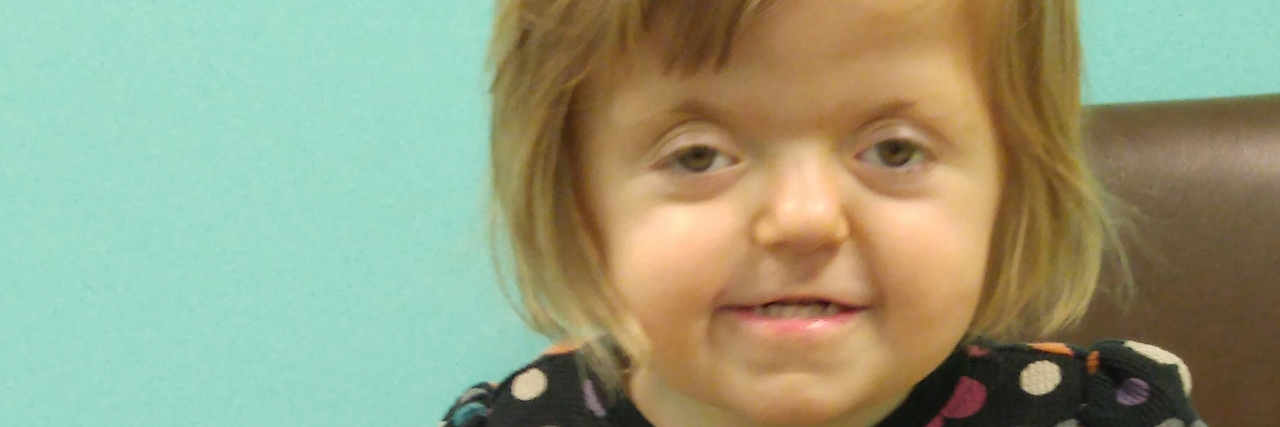Apert syndrome isn’t pretty to most people. The “ugliness,” of course, isn’t about physical appearances – not to me, anyway – but rather, it’s the “ugly” things people say or do, or maybe don’t say or don’t do. It’s ugly because it’s messy. There are no clear delineations of prognosis or even progress at times, and the myriad of surgeries and post-operative care can wreak havoc on anyone.
What’s toughest, though, is when people don’t acknowledge my daughter, Sarah. My daughter is one of the most extroverted people around. She’s always walking up to total strangers, offering her signature grin and cheerfully greeting them with, “Hi!” Most people are at least polite and return the salutation, but many then start to walk away. Sarah doesn’t let people off the hook that easily, though. She’ll follow them (and I after her), asking questions like, “Whatcha doin’?” or “What’s that?”
When people scurry away and ignore her, that breaks my heart – no, it shatters my heart into a million fragments. She doesn’t understand their response, but I do, because I used to be one of them. I used to fear people who looked different, because I didn’t know who they were, what to talk about, how to look at them, or even what to say at all.
The truth for all of us is that we fear what we don’t understand.
I think that’s why it’s so hard to talk about Apert syndrome with strangers or acquaintances, and on the rare occasion, even close family members or friends. It’s because the questions themselves seem to be enshrouded with fear.
What will happen to him/her?
How do you handle ‘XYZ’?
What if…?
We then trail into our own territory of terror, because we don’t know. We don’t have all the answers. There are aspects of Apert so nebulous, statistics don’t even exist to demonstrate patterns or predict outcomes.
So, we allow people to walk away without the impact of knowing just a little bit more than they did before they met our son or daughter.
It’s hard to talk about the fear of death, because it’s always a looming possibility. Oh, I realize we all die, and there’s no way to know when or how any of us will leave Earth. But with Apert, it can happen any time. Most of us are fairly tight-knit in the Apert community, so we always hear when an Apert kiddo passes away. And it terrifies us to the core. We think, “That could be my child. It might be one day.”
But most of the time, we file those “ugly” thoughts to the back of our minds, because we’ve had just about enough of ugliness in our lives – the words and stares, the brutal surgeries that leave bruises and scars on our precious children, and the glaring message from society that our kids are different.
So the fear of how others might react if we actually verbalized to them, “I’m scared my child might die unexpectedly” is an unfortunate reality. We don’t pretend everything’s OK all the time necessarily, but we certainly aren’t always ready to be emotionally transparent to someone who may rip open our hearts again and again.
It’s because we live with a bleeding – or at least bruised – heart to begin with. It’s a jarring vulnerability, reminding us no matter how typical we may secretly (or openly) wish our life would be, Apert syndrome is the ever-present, prevailing mystery and unwelcome visitor.
So we live with the visitor, and it becomes our companion in an odd way. But it doesn’t negate our fears – or the fears of passersby. I think anything that’s hard to talk about is related to our innate longing for acceptance and happiness, which aren’t guaranteed when ongoing challenges are present.
Regardless of who we are or what we fear, we must start the conversations, however difficult they may be. We must answer the questions, regardless of how uncomfortable they are. And we must learn to be content with the questions themselves, not always grasping in desperation for answers that may never arrive.
Yes, Apert syndrome can be a mystery, but it can also be an adventure. My sweet Sarah is proof of this. I cannot imagine the world without Sarah, or people like her. The world needs different, because — as we all know well in the Apert community – different isn’t ugly. It’s beauty in disguise.

